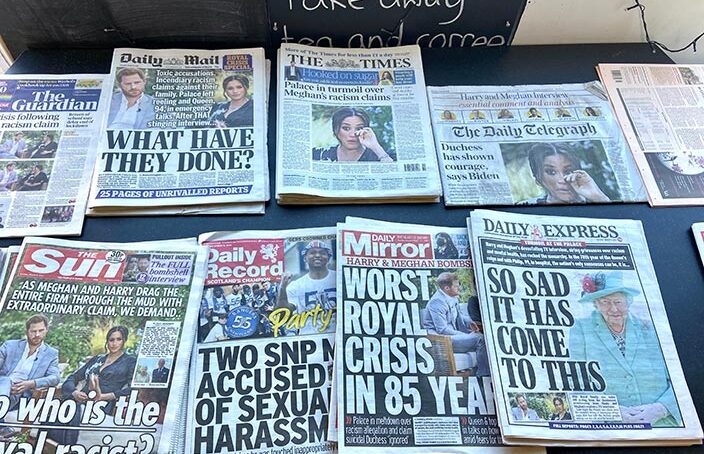FREE SPEECH CASE STUDY: “Oprah with Meghan and Harry”
Featuring an interview with American INSIGHT’s Karen Curry
In the months leading up to Meghan Markle and Prince Harry’s 2018 wedding, Oprah Winfrey asked Meghan for an interview. Meghan declined – as she claims, it was not her choice to give an interview. It was a decision for the royal institution.
Now that Meghan and Harry have formally stepped back from their royal duties, they decided to share their story. “It’s really liberating to be able to have the right and the privilege in some ways to be able to say yes,” Meghan told Oprah. “I’m ready to talk.”
According to Nielsen, 17.8 million viewers across the United States tuned in to watch “Oprah With Meghan and Harry: A CBS Primetime Special” Sunday, March 7th on CBS. In the United Kingdom, an average of 13.3 million people tuned into the special the following night on ITV, as reported by Associated Press. Worldwide viewership was estimated to reach nearly 50 million people last week, and that was before more viewers tuned into a CBS rerun of the special on Friday evening.
Oprah, one of American INSIGHT’s Free Speech Storyline heroes, is no stranger to noteworthy conversations. Throughout her career as a journalist and former talk show host, she has interviewed numerous public figures and covered stories on a variety of social issues. However, even she admitted surprise to revelations from her ‘nothing off limits’ 2-hour special with Meghan and Harry.
Since the Duke and Duchess of Sussex left Britain, the question many have wondered is: why? Meghan and Harry’s answer was much less simple, citing a combination of factors including tabloid scrutiny, mental health struggles and allegations of racism.
Much like the interview, the response from viewers and media outlets has been explosive. With a plethora of opinions, analyses and recaps, the interview has become a case study of speech: free, stifled, implied, alleged, thought-provoking and conversation-inducing. The next step is figuring out how to decipher it.
Is all fair in Free Speech?
Karen Curry, a broadcast journalist and American INSIGHT board member understands the abundance of speech out there for consumption. Having served as Bureau Chief of NBC News in London and CNN Vice President and New York Bureau Chief, she has a unique understanding of British and American media markets.
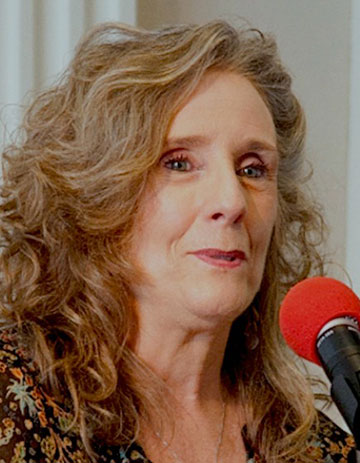
Karen Curry, broadcast journalist and American INSIGHT board member.
“In the U.K.,” Curry explains, “there are very strict regulations for broadcast journalists along the lines of impartiality and privacy.” Regulations differ for print press. As an article run in The Washington Post and The San Diego Union-Tribune about Britain’s 2010 general election described it, “Unlike the United States, where many print reporters aspire to a measure of objectivity and media bias is seen as corrupting, many of Britain’s most-read papers take sides – and aren’t afraid to flaunt it.”
This fearlessness to take a stance could specifically be applied to Britain’s tabloid press. In the 2019 documentary, “Harry & Meghan: An African Journey,” Meghan discussed her life as a working royal, wife and new mom to their son, Archie. She shared that her friends cautioned her in her early courtship with Harry, stating “the British tabloids will destroy your life.”
When asked later in the 2019 documentary how she was coping with her coverage in the tabloids, Meghan responded, “I never thought that this would be easy, but I thought it would be fair. And that’s the part that’s really hard to reconcile.”
The responsibility of journalists, as listed on the Society of Professional Journalists Code of Ethics is not just to seek the truth and report it, but also to minimize harm. They hold those in power accountable, give a voice to the voiceless and follow through with their stories, updating and correcting information. One might think ‘fairness’ as Meghan seems to view it would be included in such journalistic ethics. The problem with that lies in the difference of interpretation in what it means to be fair.
Early in their interview, Meghan and Oprah discussed the villain and hero narrative that has played out across British tabloids and the polarity in Meghan’s coverage versus Kate, the Duchess of Cambridge’s coverage. Considering this, Curry adds, “I think it’s easy for some journalistic organizations to just play that narrative and not necessarily do the research that is necessary to back it up because it sells newspapers.”
The 2019 documentary “Scandalous: The Untold Story of the National Enquirer” talks about the sensationalist history of the American tabloid. The film opens with journalist Carl Bernstein as he says, “You need to look at the Enquirer in terms of the realm of popular culture, rather than in the realm of journalism.” Whether it is the National Enquirer or any other tabloid, and whether in a realm of popular culture or journalism – it is important to remember that all qualify for freedom of speech.
Part of a royal world.
As Oprah visited a chicken coop at Meghan and Harry’s new California home, Meghan recounted catching the movie “The Little Mermaid” on television. “She falls in love with the prince and because of that, she has to lose her voice,” Meghan explained, relating it to her own story. “But by the end, she gets her voice back,” she added, proudly.
One of the most highly publicized moments of the interview with Meghan and Harry came as Oprah fired the question: “Were you silent, or were you silenced?” Meghan responded, “The latter,” explaining the firm’s regulation of what she could comment on and where she could go because of how it would appear in the press and to the public.
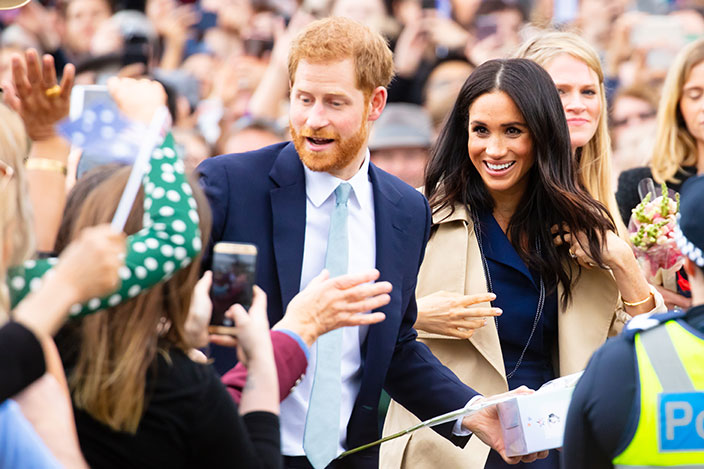
The Duke and Duchess of Sussex greet crowds while on a royal visit to Melbourne, Australia in 2018.
FiledIMAGE / Shutterstock.com
Harry describes his family’s relationship with the press as having “a level of control by fear, that has existed for generations…” He described an “invisible contract” between the institution and the U.K. tabloids specifically, where family members will wine and dine reporters in exchange for good press.
As journalists, Oprah and Karen Curry agree, there is a symbiotic relationship between the press and their subjects where the existence of one enables the other to exist. When it comes to living life constantly in fear of public perception, Curry adds, “Whether it’s politicians or celebrities or advocates who are working on behalf of some cause that they’re supporting, once you get to the point where you are afraid to do something for fear that the press is then going to pillory you…that’s pretty scary.”
A major point in Meghan’s claims were the lack of opportunity she was offered to negate false stories published about her by the tabloids, and the lack of protection and defense she received from the palace for those publications. Thinking of his late mother, Princess Diana and her complicated relationship with the press, Harry said to Oprah, “My biggest concern was history repeating itself.”
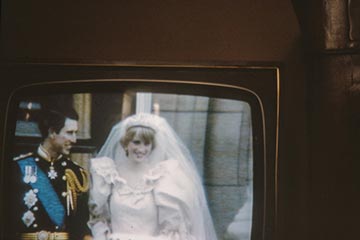
The televised broadcast of Prince Charles and Princess Diana’s wedding in 1981.
Annie Spratt / Unsplash.com
It is often believed that as a public figure, you must be willing to make concessions in terms of privacy and anonymity. “That whole thing about privacy, it gets tricky,” Curry says. “You have to be willing to go along with some of the things that are implied… because you are public, but it doesn’t give the press the opportunity to do whatever they want, to be deceptive and all that sort of thing.”
Privacy is an important thing to consider for those born into a place of public interest, particularly the children of celebrities or in this case, royals. As someone who inherited his role, Harry told Oprah that he was “trapped within the system,” living much of his life without realizing how trapped he was.
Normally, when celebrities, politicians or other public figures express concern for privacy, they are not also subject to approval from a royal institution or communications team. Harry may have inherited his role as a royal and public figure, but he should not have to inherit the stifled voice that may come with it.
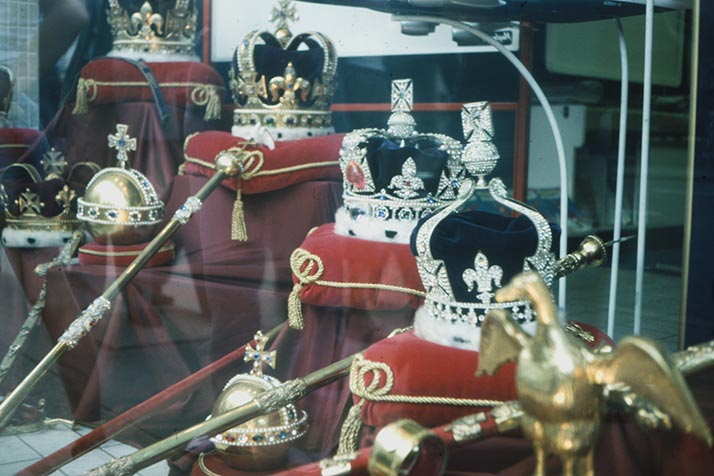
A store window display in London with crowns and scepters to celebrate the marriage of Prince Charles and Princess Diana in 1981.
Annie Spratt / Unsplash.com
Recently, Meghan and Harry have successfully challenged their coverage in the U.K. tabloids. In February, Meghan won a lawsuit against Associated Newspapers after the Mail on Sunday published excerpts from a personal letter she wrote to her father, Thomas Markle. GMA reported that Associated Newspapers allegedly had Mr. Markle’s consent to publish the letter and present his side of his estranged relationship with Meghan. A judge, however, ruled that the tabloid violated Meghan’s right to privacy.
“For these outlets, it’s a game,” Meghan said in a statement following her legal win. “For me and so many others, it’s real life, real relationships, and very real sadness…We all lose when misinformation sells more than truth, when moral exploitation sells more than decency, and when companies create their business model to profit from people’s pain.”
Reports in Variety reveal that Associated Newspapers sent letters to ViacomCBS, OWN and ITV following Meghan and Harry’s interview because of the program’s alleged “deliberate distortion and doctoring of newspaper headlines in the misleading montage of British newspapers.” Associated Newspapers called for the montage to be immediately removed from the broadcast. Oprah’s Harpo Productions told Variety that they stand by the program in its entirety, as it is Meghan and Harry’s personal story.
The interview heard ‘round the world.
During their interview, Oprah asked Meghan if she was afraid of the backlash she might receive from the palace for her story and its allegations. “I’m not going to live my life in fear,” Meghan responded. “I don’t know how they could expect that after all of this time, we would still just be silent if there is an active role that the firm is playing in perpetuating falsehoods about us.”
Almost immediately, viewers began taking sides. In a poll released by YouGov early last week, 47% of Americans said their sympathies were with Meghan and Harry, while 23% lie with the royal family. A similar YouGov poll in Britain saw nearly opposite results, with 36% of Britons sympathizing with the Queen and the royal family, and 22% sympathizing with Meghan and Harry.
From a journalistic standpoint, Curry emphasizes the necessity of a variety of perspectives. In many sit-down interviews like Meghan and Harry’s, viewers lack statements or input from those facing the allegations; in this case, the royal family and institution. “I do think there is a lot of follow up that journalists should do on these allegations,” Curry says, “because the allegations are strong. They’re big. They’re serious.”
Two days after the interview aired in the United States, Buckingham Palace released a statement on behalf of the Queen. In full, it said: “The whole family is saddened to learn the full extent of how challenging the last few years have been for Harry and Meghan. The issues raised, particularly that of race, are concerning. Whilst some recollections may vary, they are taken very seriously and will be addressed by the family privately. Harry, Meghan and Archie will always be much loved family members.”
There has been much speculation surrounding the interview’s impact on the rest of the royal family; particularly Harry’s father, Prince Charles and his brother, Prince William. When asked by reporters about the interview, Prince Charles offered no comment. Prince William commented briefly, negating the allegations of racism in the family.
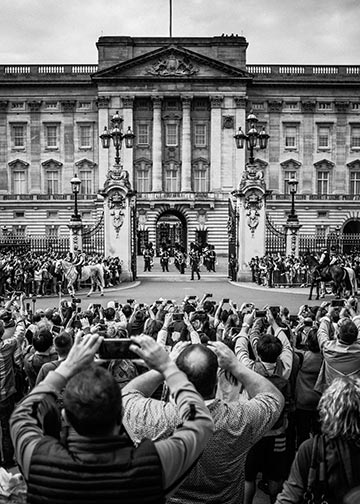
Crowds gather outside Buckingham Palace for the Changing of the Guard ceremony.
hoch3media / Unsplash.com
In contrast to the royal family’s minimal responses, there has been a surplus of opinions from the public. Countless new stories and analyses, talk show discussions, social media posts and videos have been published in the last week – and new stories are still coming.
Perhaps most notable were comments made on Monday by Piers Morgan on “Good Morning Britain” regarding Meghan’s struggles with mental health and suicidal thoughts. “I’m sorry. I don’t believe a word she says, Meghan Markle,” Morgan said. “I wouldn’t believe it if she read me a weather report. And the fact that she’s fired up this onslaught against our royal family, I think is contemptible.”
Discussions about the interview and its allegations of racism continued the following day when Morgan engaged in a heated debate with his “Good Morning Britain” guest co-host, Alex Beresford. Morgan stormed off set during their conversation, and later announced he would be leaving the program after serving as co-host for the past six years.
According to BBC, U.K. media regulator Ofcom received 41,000 complaints for Morgan’s comments, including one from representatives of Meghan Markle. Ofcom has since launched further investigation.
Sharon Osbourne, a friend of Morgan’s, came to his defense. “I am with you,” she stated on Twitter. “I stand by you. People forget that you’re paid for your opinion and that you’re just speaking your truth.” Her defense of Morgan lead to a heated discussion about racism with her own co-hosts on CBS’s “The Talk.” A report in Variety stated that the talk show canceled two shows this week while it conducts an internal review of the hosts’ discussion. Osbourne apologized on Twitter to those offended by her remarks.
Piers Morgan, however, stands by his comments. “On Monday, I said I didn’t believe Meghan Markle in her Oprah interview,” Morgan said on Twitter. “I’ve had time to reflect on this opinion, and I still don’t. If you did, OK. Freedom of speech is a hill I’m happy to die on. Thanks for all the love, and hate. I’m off to spend more time with my opinions.”
Other public figures have offered support to Meghan and Harry following their interview. Beyoncé and Serena Williams took to social media to thank Meghan for her courage in sharing her story. Former First Lady Michelle Obama also commented, telling Access Hollywood: “My hope is that, when I think about what they’re going through, I think about the importance of family and I just pray that there is forgiveness and there is clarity and love and resolve at some point in time.”
Only time will tell.
The future of free speech.
Meghan and Harry’s interview with Oprah and the conversation that has followed is a great reminder of every citizen’s right to speak freely, express their opinions, make allegations and defend themselves. Equally noted is the importance of listening to and considering opinions that one may not agree with or fully understand.
“I think we’re all really at the point where we are trying to examine [the fine lines of free speech],” Curry said. “It will be a while before any of us decides on what amount of [speech] we think is the correct amount without veering into an area that would be stifling free speech…There’s a lot of speech out there, that’s for sure.”
For additional reading:
For further discussion about the right to free speech, readers are invited to check out American INSIGHT’s annual Free Speech Film Festival.
By Kristi Szczesny, American INSIGHT Content Strategist
—
Featured image courtesy of Lorna Roberts / Shutterstock.com

